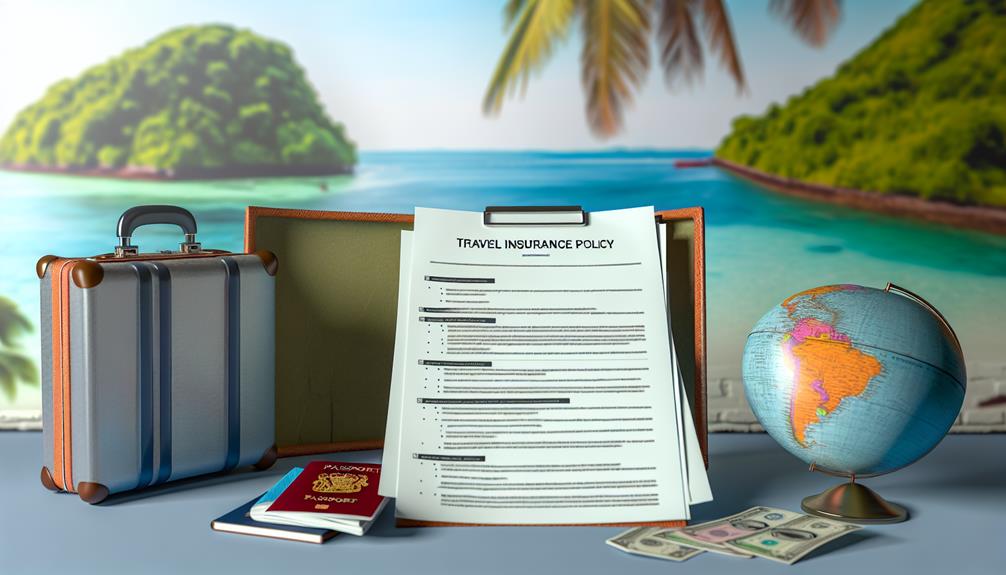To get thorough journey insurance coverage, start by comparing different policies to find one that suits your travel needs. Look for coverage that includes trip cancellation, emergency medical expenses, and baggage loss. Don't forget to assess limits and exclusions, as they can greatly affect your protection. Use comparison websites like Squaremouth or TravelInsurance.com to make it easier. Consider optional add-ons like Cancel for Any Reason (CFAR) for added flexibility. Finally, check customer reviews and provider reputations to guarantee reliability. There's more valuable information about this to help you secure the best coverage for your trip.
Key Takeaways
- Compare quotes from various travel insurance providers using comparison websites for the best comprehensive coverage options and prices.
- Review policy features, including trip cancellation benefits, emergency medical coverage, and evacuation limits to ensure adequate protection.
- Understand exclusions in policies to avoid surprises, particularly regarding high-risk activities and pre-existing conditions.
- Consider optional add-ons like Cancel for Any Reason (CFAR) and pre-existing condition waivers for additional flexibility and coverage.
- Analyze customer reviews and provider reputation to ensure reliable claims processing and high satisfaction levels among previous travelers.
Importance of Comprehensive Coverage
When planning a trip, extensive travel insurance is your safety net. All-encompassing travel insurance provides essential coverage that protects you against unforeseen events like trip cancellations, medical emergencies, and baggage loss. You want peace of mind knowing that you're covered, no matter what happens while you're away.
If you face a medical emergency abroad, having robust coverage means you can access necessary care without worrying about costs. Many all-encompassing plans also include emergency evacuation and 24-hour traveler assistance, ensuring you get the help you need whenever it arises. This level of support is crucial during stressful situations.
Moreover, all-encompassing travel insurance isn't just for leisure trips; it covers business travel too, making it a versatile choice. You can also customize your policy with optional add-ons, like Cancel for Any Reason (CFAR) coverage, giving you the flexibility to change your plans without penalties.
With many plans boasting a 100% customer recommendation rate and high satisfaction ratings, you can trust that all-encompassing coverage is reliable. By investing in this type of insurance, you're securing your travels and ensuring a smoother, worry-free experience.
Types of Travel Insurance
Travel insurance comes in various types, each designed to address specific needs during your trip. Understanding these types helps you choose the right coverage. Here are four main types of travel insurance you should consider:
- Extensive travel insurance plans: These combine trip cancellation, medical expenses, baggage protection, and emergency evacuation into one policy.
- Trip cancellation insurance: This protects you if you need to cancel your trip for covered reasons, guaranteeing you don't lose your investment.
- Medical travel insurance: This covers medical expenses incurred while traveling, which is especially important when traveling internationally.
- Baggage insurance: This provides baggage protection, compensating you for lost or delayed luggage.
Many extensive plans also offer optional add-ons like Cancel for Any Reason (CFAR) coverage, giving you flexibility when plans change. Coverage limits vary, with trip cancellation limits often matching your total trip cost, while medical and baggage coverage limits are typically separate. To guarantee you get the best travel protection, take the time to compare plans based on your destination, trip length, and personal health risks. By doing so, you can secure the right coverage for your unique travel needs.
Key Features to Consider

Choosing the right journey insurance coverage means paying attention to key features that can substantially impact your trip. First, look for extensive policies that include trip cancellation benefits, which can reimburse you for up to 100% of non-refundable expenses if you need to cancel for covered reasons. Emergency medical coverage is another vital feature; some policies cover medical and dental expenses up to $1 million during your travels.
Don't overlook evacuation coverage, either. This guarantees you'll be transported to the nearest medical facility or repatriated if necessary. For your belongings, consider coverage limits for baggage loss, theft, or damage, which can range from $1,000 to $3,000 or more, depending on your chosen plan.
Additionally, you might want to explore optional add-ons like Cancel for Any Reason (CFAR). This feature allows you to cancel your trip for virtually any reason, typically reimbursing around 75% of your non-refundable costs if purchased within a specified time frame. By carefully evaluating these key features, you can tailor your insurance policies to meet your specific travel needs and provide peace of mind throughout your journey.
Assessing Coverage Limits
Evaluating coverage limits is vital to confirm you're fully protected during your trip. Here are four key areas to focus on:
- Trip Cancellation Limits: Verify your extensive plan covers the total cost of your trip, including all prepaid non-refundable expenses.
- Medical Coverage: Look for plans that offer higher protection amounts for emergency medical expenses, as these can vary considerably between policies.
- Baggage Insurance: Check the specific limits on compensation for baggage loss, theft, or damage; these can differ based on the policy you select.
- Optional Benefits: Consider adding features like Cancel for Any Reason (CFAR) coverage, which increases overall costs but offers reimbursement for 75% of trip costs for non-covered cancellations.
It's essential to thoroughly review your individual policy certificate to understand the specific exclusions and maximum limits applicable to various claims. By grasping these coverage limits, you can confirm that you have adequate protection amounts tailored to your travel needs and avoid any unpleasant surprises during your journey.
Understanding Exclusions

While planning your trip, it's vital to understand the exclusions in your detailed journey insurance policy, as they outline situations that won't be covered in case of a claim. Extensive journey insurance often comes with specific insurance exclusions that can impact your claims coverage greatly. For instance, if you engage in high-risk activities, injuries from those activities may not be covered. Similarly, pre-existing conditions typically require waivers for coverage—without them, you're likely left unprotected.
Common exclusions also include losses due to travel delays caused by weather or cancellations that arise from personal decisions rather than covered reasons. Additionally, most travel insurance policies won't cover claims related to acts of war, civil unrest, or terrorism, so it's important to assess destination-specific risks beforehand.
You should also be aware that certain events, like pregnancy or elective procedures, often fall outside of coverage limitations. To avoid unpleasant surprises, take the time to carefully read the policy certificate and fully grasp the exclusions. Understanding these risks will help guarantee you have the protection you need while traveling.
Purchasing Tips and Strategies
When you're ready to purchase journey insurance, comparing quotes from multiple providers is crucial for finding the best coverage at the right price. Start your journey with these purchasing tips:
- Use Comparison Sites: Check travel insurance comparison sites like Squaremouth or TravelInsurance.com to easily compare quotes and find suitable travel insurance coverage.
- Review Detailed Plans: Look closely at coverage limits for trip cancellation, medical expenses, and evacuation, as these can vary markedly between policies.
- Consider Add-Ons: Optional coverage like Cancel for Any Reason (CFAR) can provide added flexibility, though it may increase your costs by up to 40%.
- Check Pre-Existing Condition Waivers: If applicable, be mindful of the time-sensitive nature of pre-existing condition waivers, which usually require you to purchase the policy within 14 days of your initial trip deposit.
Lastly, read customer reviews to assess satisfaction levels and verify a reliable claims process. Taking these steps can lead to a more informed decision, helping you secure detailed plans that meet your needs.
Comparing Insurance Providers

Maneuvering the world of journey insurance providers can feel overwhelming, but a few strategic steps can simplify the process. Start by utilizing travel insurance comparison websites like Squaremouth and TravelInsurance.com to easily compare quotes and coverage options tailored to your trip specifics. This allows you to see various policies side by side, helping you make an informed decision.
Next, explore customer reviews for providers such as Allianz and AIG Travel Guard. These insights can reveal their reputation for customer service and claims processing efficiency, which are essential when you need support. Pay close attention to the coverage limits and exclusions of each policy. Extensive plans can vary greatly regarding protection offered for trip cancellation, medical expenses, and baggage loss.
Also, consider any existing travel insurance benefits your credit cards might offer. These benefits could complement or even replace the need for additional extensive coverage. Finally, evaluate optional add-ons that might enhance your policy, but keep in mind that they can increase your overall costs. By following these steps, you'll find the best travel insurance to suit your needs.
Optional Add-Ons and Riders
After comparing insurance providers and finding a policy that meets your needs, consider enhancing your coverage with optional add-ons and riders. These enhancements can provide you with peace of mind during your travels. Here are some popular options to think about:
- Cancel for Any Reason (CFAR): This coverage allows you to cancel your trip for reasons not typically covered, reimbursing you for up to 75% of trip costs.
- Pre-existing Condition Waivers: If you have existing health issues, these waivers enable you to secure coverage if you purchase your policy within a specified time frame after making a trip deposit.
- Rental Car Damage Coverage: Protect yourself financially against damages to rental vehicles during your trip with this add-on.
- Financial Default Coverage: This option safeguards you against the failure of travel suppliers—like airlines or hotels—to meet their obligations.
Common Misconceptions About Insurance

Travelers often underestimate the importance of journey insurance, leading to several common misconceptions. Many believe that all travel insurance policies offer the same coverage, but there's significant variability in benefits and exclusions. You might think travel insurance is unnecessary for short trips, yet even low-cost adventures can lead to financial losses from trip cancellations or medical emergencies without proper coverage.
Here's a quick look at some common misconceptions:
| Misconception | Reality | Impact |
|---|---|---|
| All travel insurance is the same | Coverage varies by provider | You might miss essential benefits |
| Travel insurance is for expensive trips only | Affordable options exist | You could face high costs unexpectedly |
| Claims processing is complicated | Streamlined processes are often available | Delays in claims can happen without guidance |
Additionally, many travelers assume their existing health insurance covers international travel, but that's often not the case. Gaps in coverage can leave you vulnerable. Understanding these misconceptions helps you choose thorough protection that suits your needs, ensuring peace of mind on your journey.
Frequently Asked Questions
What Is Comprehensive Travel Coverage?
Extensive travel coverage combines various types of insurance to protect you during your trips. It usually covers trip cancellations, medical expenses, baggage loss, and emergency evacuations. If you need to cancel your trip for covered reasons like illness or natural disasters, you can get back 100% of non-refundable costs. Many plans offer options like Cancel for Any Reason and pre-existing condition waivers, giving you even more flexibility and peace of mind while traveling.
Can You Get Fully Comprehensive Car Insurance?
Yes, you can get fully inclusive car insurance. It covers damage to your own vehicle and third-party property, offering the highest protection level. You'll find it includes theft, fire, and personal injury coverage. To secure the best deal, compare quotes from various providers and review policy details carefully. Consider your driving history, vehicle type, and location, as these factors affect your premiums. Bundling with other types of insurance might also save you money.
What's the Difference Between Basic and Comprehensive Travel Insurance?
When you're choosing travel insurance, the difference between basic and extensive plans is significant. Basic insurance usually covers trip cancellations, lost baggage, and some medical expenses. In contrast, extensive plans offer more thorough coverage, including emergency evacuation, higher medical limits, and optional features like Cancel for Any Reason. You'll find that extensive plans generally provide greater financial security and higher customer satisfaction, making them a better choice for peace of mind during your travels.
What Is the Best Travel Insurance to Buy?
When you're looking for the best travel insurance, consider extensive plans that cover trip cancellations, medical expenses, and more. Providers like Generali Global Assistance and Travelex often receive high customer satisfaction ratings, so they're worth checking out. Don't forget to compare coverage limits and exclusions to find the policy that fits your needs and budget. A good plan can protect you from unexpected events during your travels, ensuring peace of mind.
